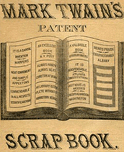"and Launcelot abide . . ." |
|
The story isn't a satire peculiarly, it is more especially a contrast. It merely exhibits under high lights the daily life of the time & that of to-day; & necessarily the bringing them into this immediate juxtaposition emphasizes the salients of both. Only two or three chapters of the book have been written, thus far. I expect to write three chapters a year for thirty years; then the book will be done. I am writing it for posterity only; my posterity; my great grandchildren. It is to be my holiday amusement for six days every summer the rest of my life. Of course I do not expect to publish it; nor indeed any other book -- though I fully expect to write one other book besides this one; two others, in fact, if one's autobiography may be called a book -- in fact mine will be nearer a library. Of course in my story I shall leave unsmirched &
unbelittled the great & beautiful characters drawn by
the master hand of old Malory (if he drew them -- at any rate he
gave them to us) -- I am only after the life of
that day, that is all; to picture it; to try to get into it; to
see how it feels & seems. I shall hope that under my hand Sir
Galahad will still remain the divinest spectre that one glimpses
among the mists & twilights of Dreamland across the wastes of
the centuries; & Arthur keep his sweetness & his purity,
and Launcelot abide & continue "the kindest man that ever
strake the sword," yet "the sternest knight to his mortal foe
that ever put spear in the rest;" & I should grieve indeed if
the final disruption of the Round Table, & the extinction of
its old tender & gracious friendships, & that last battle
-- the Battle of the Broken Hearts, it might be called -- should
lose their pathos & their tears through my
handling. |

